Olufemi Salami's Learning Contract for Energy & Procurement Project
VerifiedAdded on 2020/04/21
|26
|6028
|287
Project
AI Summary
This project report presents Olufemi Salami's learning contract for the Energy & Procurement Department's Oil & Gas Programme Project/Placement, focusing on project design and implementation, specifically the PPDI5039 module. The contract outlines the project's aim, which is to identify roles and set expectations between the student and tutor, James Milne, utilizing simulation as the primary methodology. The student aims to develop competencies in teamwork, planning, data analysis, and feedback. The report details the project's justification, methods, timetable, and evidence of accomplishment, including a portfolio of evidence such as a learning contract, project report, log books, and critical incident diaries. The document also includes an ethics review form and a weekly learning log, demonstrating the student's reflection on the learning process and adherence to ethical guidelines. The simulation approach is chosen for its ability to bridge theoretical understanding with practical learning, providing real-life experiences and addressing challenges within a project environment. The project's timetable spans 12 weeks, with the simulation phase lasting four weeks, and includes activities such as revising course modules, warm-up exercises, and data analysis to inform strategic decisions.
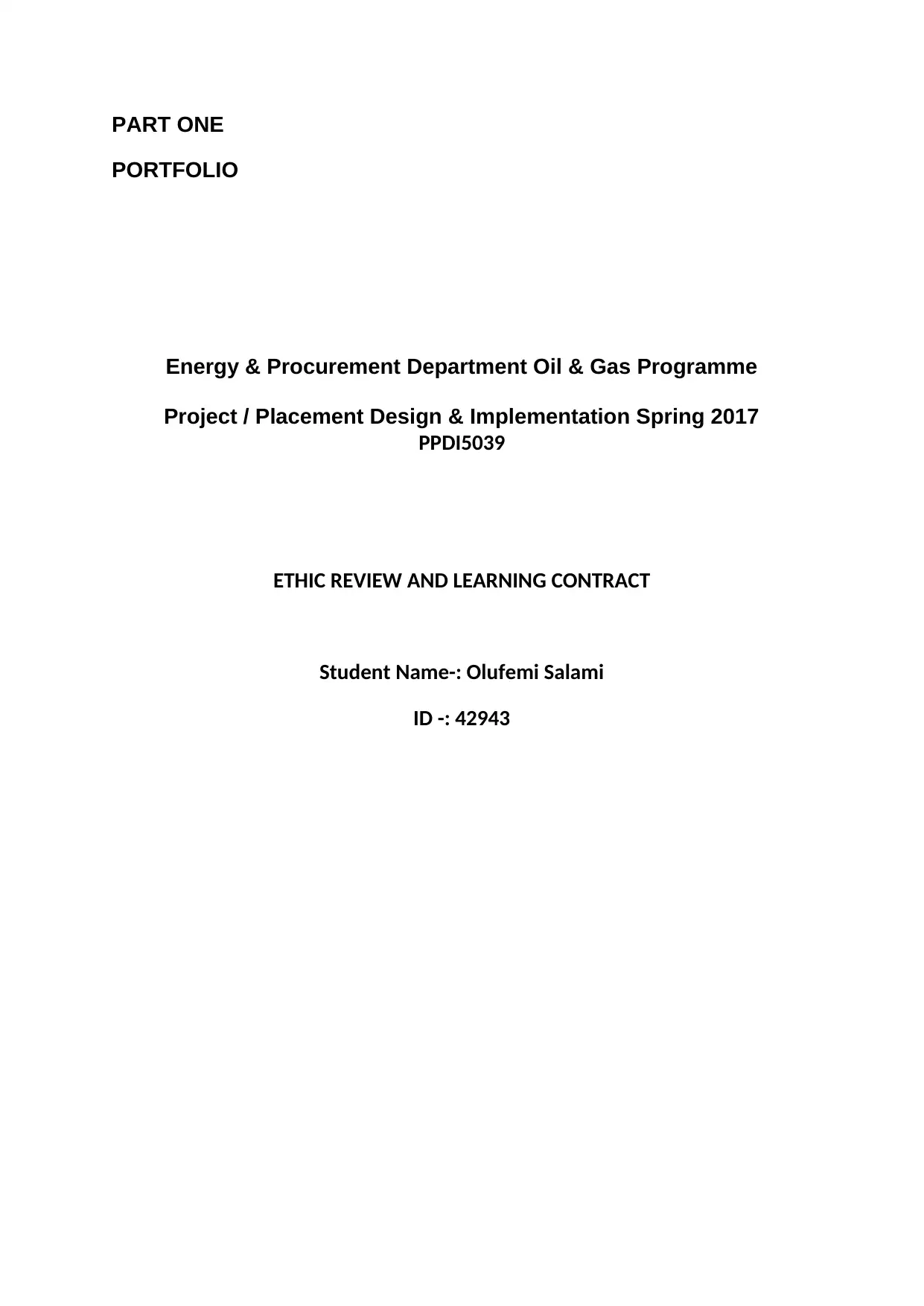
PART ONE
PORTFOLIO
Energy & Procurement Department Oil & Gas Programme
Project / Placement Design & Implementation Spring 2017
PPDI5039
ETHIC REVIEW AND LEARNING CONTRACT
Student Name-: Olufemi Salami
ID -: 42943
PORTFOLIO
Energy & Procurement Department Oil & Gas Programme
Project / Placement Design & Implementation Spring 2017
PPDI5039
ETHIC REVIEW AND LEARNING CONTRACT
Student Name-: Olufemi Salami
ID -: 42943
Paraphrase This Document
Need a fresh take? Get an instant paraphrase of this document with our AI Paraphraser
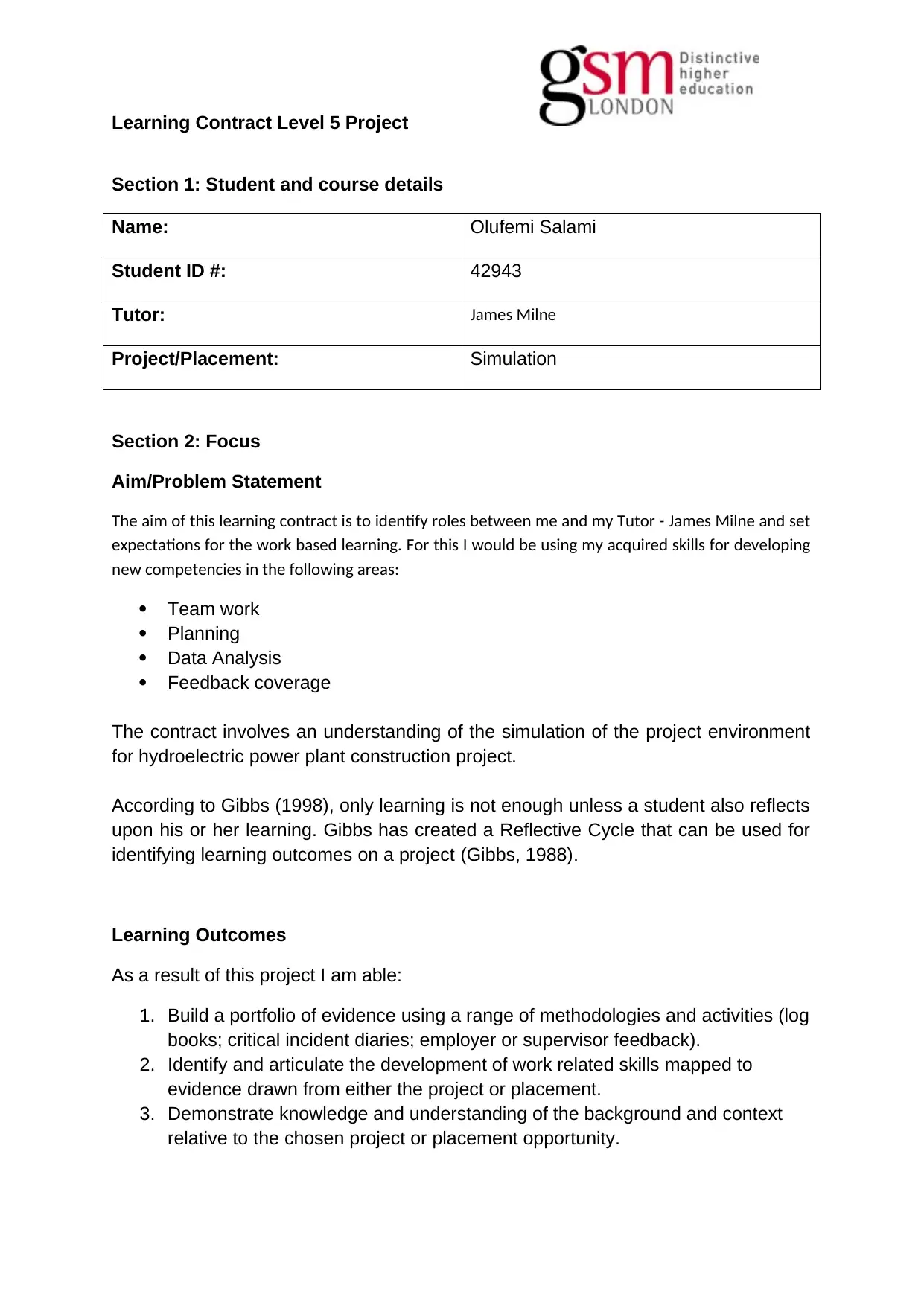
Learning Contract Level 5 Project
Section 1: Student and course details
Name: Olufemi Salami
Student ID #: 42943
Tutor: James Milne
Project/Placement: Simulation
Section 2: Focus
Aim/Problem Statement
The aim of this learning contract is to identify roles between me and my Tutor - James Milne and set
expectations for the work based learning. For this I would be using my acquired skills for developing
new competencies in the following areas:
Team work
Planning
Data Analysis
Feedback coverage
The contract involves an understanding of the simulation of the project environment
for hydroelectric power plant construction project.
According to Gibbs (1998), only learning is not enough unless a student also reflects
upon his or her learning. Gibbs has created a Reflective Cycle that can be used for
identifying learning outcomes on a project (Gibbs, 1988).
Learning Outcomes
As a result of this project I am able:
1. Build a portfolio of evidence using a range of methodologies and activities (log
books; critical incident diaries; employer or supervisor feedback).
2. Identify and articulate the development of work related skills mapped to
evidence drawn from either the project or placement.
3. Demonstrate knowledge and understanding of the background and context
relative to the chosen project or placement opportunity.
Section 1: Student and course details
Name: Olufemi Salami
Student ID #: 42943
Tutor: James Milne
Project/Placement: Simulation
Section 2: Focus
Aim/Problem Statement
The aim of this learning contract is to identify roles between me and my Tutor - James Milne and set
expectations for the work based learning. For this I would be using my acquired skills for developing
new competencies in the following areas:
Team work
Planning
Data Analysis
Feedback coverage
The contract involves an understanding of the simulation of the project environment
for hydroelectric power plant construction project.
According to Gibbs (1998), only learning is not enough unless a student also reflects
upon his or her learning. Gibbs has created a Reflective Cycle that can be used for
identifying learning outcomes on a project (Gibbs, 1988).
Learning Outcomes
As a result of this project I am able:
1. Build a portfolio of evidence using a range of methodologies and activities (log
books; critical incident diaries; employer or supervisor feedback).
2. Identify and articulate the development of work related skills mapped to
evidence drawn from either the project or placement.
3. Demonstrate knowledge and understanding of the background and context
relative to the chosen project or placement opportunity.
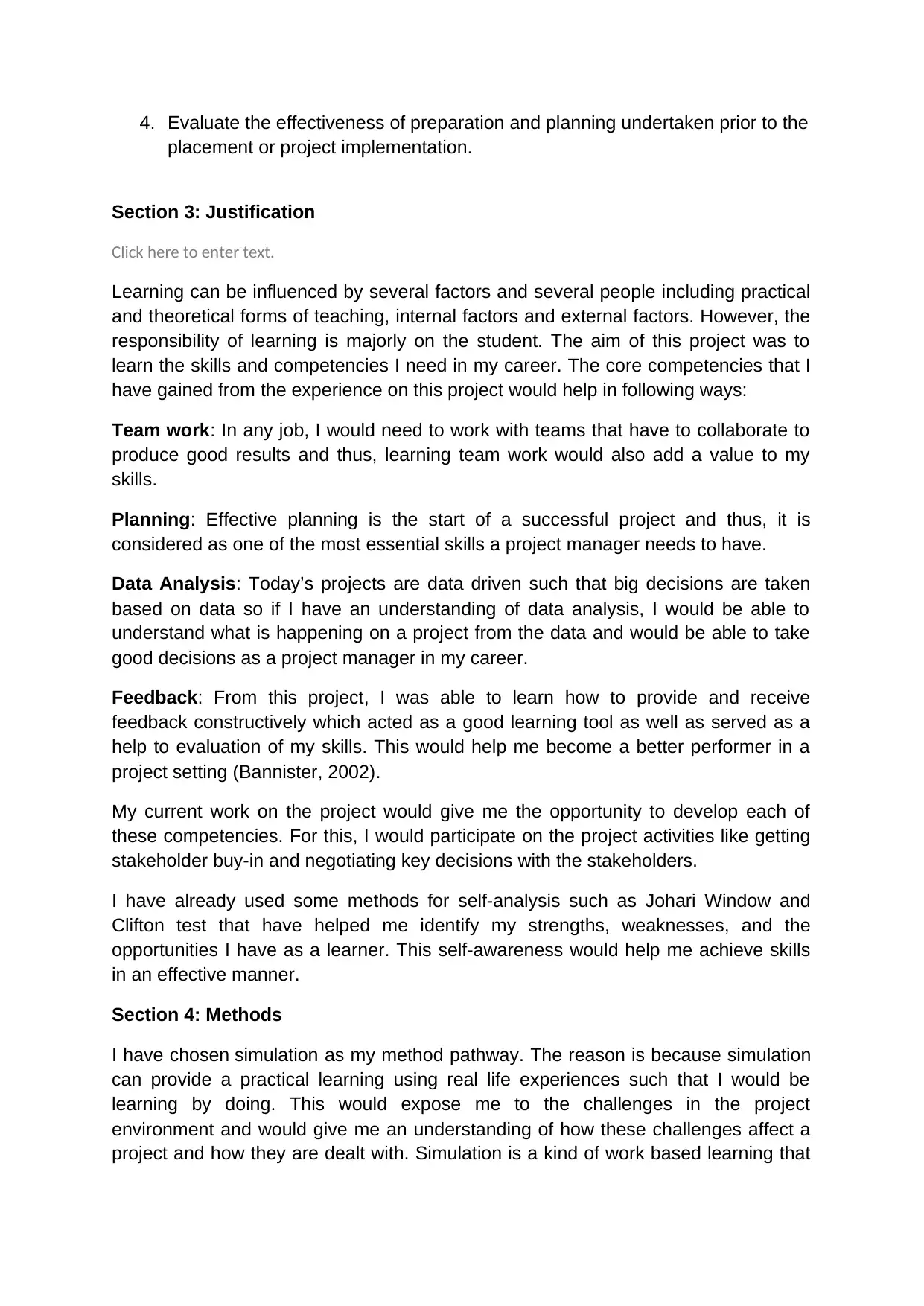
4. Evaluate the effectiveness of preparation and planning undertaken prior to the
placement or project implementation.
Section 3: Justification
Click here to enter text.
Learning can be influenced by several factors and several people including practical
and theoretical forms of teaching, internal factors and external factors. However, the
responsibility of learning is majorly on the student. The aim of this project was to
learn the skills and competencies I need in my career. The core competencies that I
have gained from the experience on this project would help in following ways:
Team work: In any job, I would need to work with teams that have to collaborate to
produce good results and thus, learning team work would also add a value to my
skills.
Planning: Effective planning is the start of a successful project and thus, it is
considered as one of the most essential skills a project manager needs to have.
Data Analysis: Today’s projects are data driven such that big decisions are taken
based on data so if I have an understanding of data analysis, I would be able to
understand what is happening on a project from the data and would be able to take
good decisions as a project manager in my career.
Feedback: From this project, I was able to learn how to provide and receive
feedback constructively which acted as a good learning tool as well as served as a
help to evaluation of my skills. This would help me become a better performer in a
project setting (Bannister, 2002).
My current work on the project would give me the opportunity to develop each of
these competencies. For this, I would participate on the project activities like getting
stakeholder buy-in and negotiating key decisions with the stakeholders.
I have already used some methods for self-analysis such as Johari Window and
Clifton test that have helped me identify my strengths, weaknesses, and the
opportunities I have as a learner. This self-awareness would help me achieve skills
in an effective manner.
Section 4: Methods
I have chosen simulation as my method pathway. The reason is because simulation
can provide a practical learning using real life experiences such that I would be
learning by doing. This would expose me to the challenges in the project
environment and would give me an understanding of how these challenges affect a
project and how they are dealt with. Simulation is a kind of work based learning that
placement or project implementation.
Section 3: Justification
Click here to enter text.
Learning can be influenced by several factors and several people including practical
and theoretical forms of teaching, internal factors and external factors. However, the
responsibility of learning is majorly on the student. The aim of this project was to
learn the skills and competencies I need in my career. The core competencies that I
have gained from the experience on this project would help in following ways:
Team work: In any job, I would need to work with teams that have to collaborate to
produce good results and thus, learning team work would also add a value to my
skills.
Planning: Effective planning is the start of a successful project and thus, it is
considered as one of the most essential skills a project manager needs to have.
Data Analysis: Today’s projects are data driven such that big decisions are taken
based on data so if I have an understanding of data analysis, I would be able to
understand what is happening on a project from the data and would be able to take
good decisions as a project manager in my career.
Feedback: From this project, I was able to learn how to provide and receive
feedback constructively which acted as a good learning tool as well as served as a
help to evaluation of my skills. This would help me become a better performer in a
project setting (Bannister, 2002).
My current work on the project would give me the opportunity to develop each of
these competencies. For this, I would participate on the project activities like getting
stakeholder buy-in and negotiating key decisions with the stakeholders.
I have already used some methods for self-analysis such as Johari Window and
Clifton test that have helped me identify my strengths, weaknesses, and the
opportunities I have as a learner. This self-awareness would help me achieve skills
in an effective manner.
Section 4: Methods
I have chosen simulation as my method pathway. The reason is because simulation
can provide a practical learning using real life experiences such that I would be
learning by doing. This would expose me to the challenges in the project
environment and would give me an understanding of how these challenges affect a
project and how they are dealt with. Simulation is a kind of work based learning that
⊘ This is a preview!⊘
Do you want full access?
Subscribe today to unlock all pages.

Trusted by 1+ million students worldwide
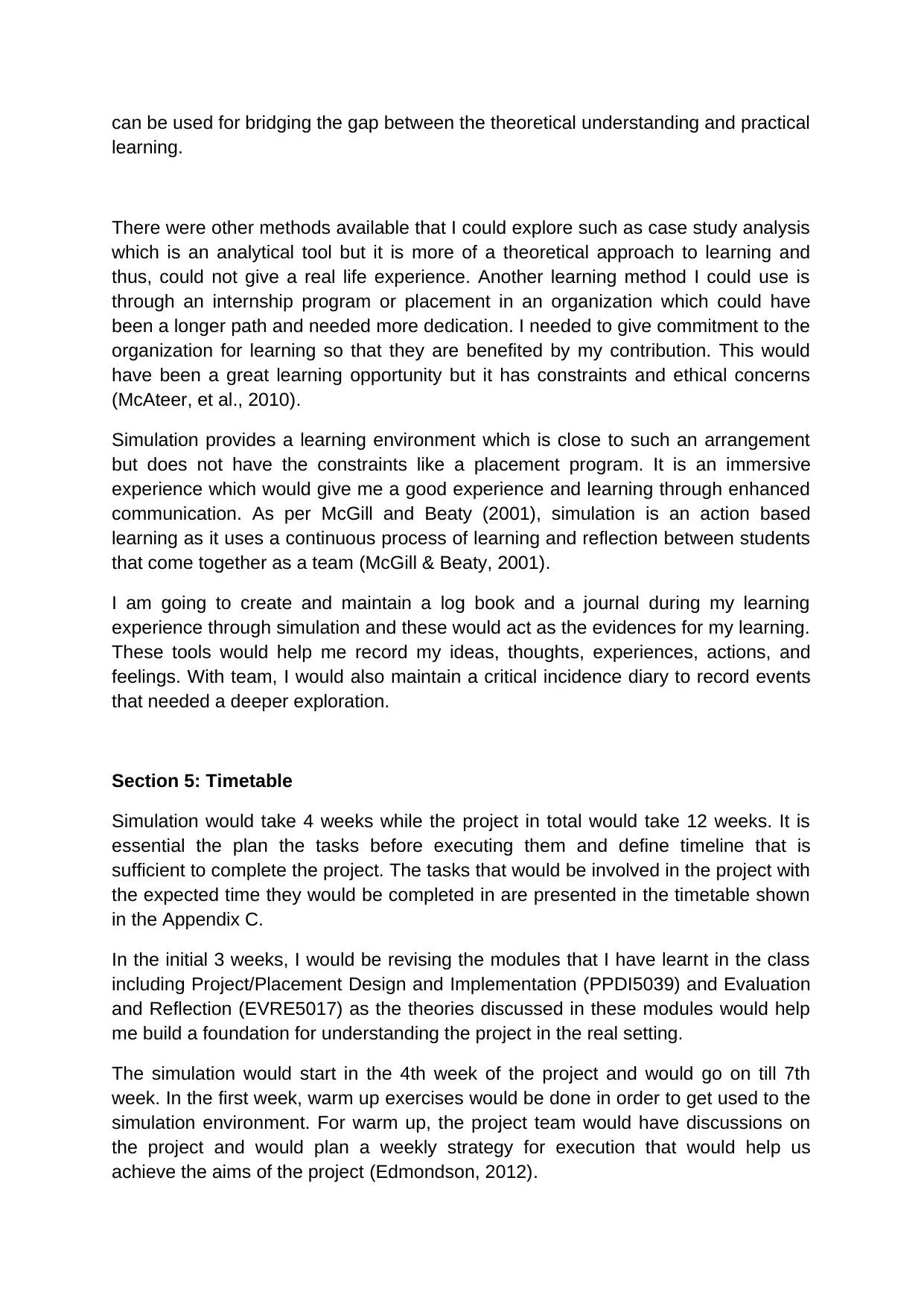
can be used for bridging the gap between the theoretical understanding and practical
learning.
There were other methods available that I could explore such as case study analysis
which is an analytical tool but it is more of a theoretical approach to learning and
thus, could not give a real life experience. Another learning method I could use is
through an internship program or placement in an organization which could have
been a longer path and needed more dedication. I needed to give commitment to the
organization for learning so that they are benefited by my contribution. This would
have been a great learning opportunity but it has constraints and ethical concerns
(McAteer, et al., 2010).
Simulation provides a learning environment which is close to such an arrangement
but does not have the constraints like a placement program. It is an immersive
experience which would give me a good experience and learning through enhanced
communication. As per McGill and Beaty (2001), simulation is an action based
learning as it uses a continuous process of learning and reflection between students
that come together as a team (McGill & Beaty, 2001).
I am going to create and maintain a log book and a journal during my learning
experience through simulation and these would act as the evidences for my learning.
These tools would help me record my ideas, thoughts, experiences, actions, and
feelings. With team, I would also maintain a critical incidence diary to record events
that needed a deeper exploration.
Section 5: Timetable
Simulation would take 4 weeks while the project in total would take 12 weeks. It is
essential the plan the tasks before executing them and define timeline that is
sufficient to complete the project. The tasks that would be involved in the project with
the expected time they would be completed in are presented in the timetable shown
in the Appendix C.
In the initial 3 weeks, I would be revising the modules that I have learnt in the class
including Project/Placement Design and Implementation (PPDI5039) and Evaluation
and Reflection (EVRE5017) as the theories discussed in these modules would help
me build a foundation for understanding the project in the real setting.
The simulation would start in the 4th week of the project and would go on till 7th
week. In the first week, warm up exercises would be done in order to get used to the
simulation environment. For warm up, the project team would have discussions on
the project and would plan a weekly strategy for execution that would help us
achieve the aims of the project (Edmondson, 2012).
learning.
There were other methods available that I could explore such as case study analysis
which is an analytical tool but it is more of a theoretical approach to learning and
thus, could not give a real life experience. Another learning method I could use is
through an internship program or placement in an organization which could have
been a longer path and needed more dedication. I needed to give commitment to the
organization for learning so that they are benefited by my contribution. This would
have been a great learning opportunity but it has constraints and ethical concerns
(McAteer, et al., 2010).
Simulation provides a learning environment which is close to such an arrangement
but does not have the constraints like a placement program. It is an immersive
experience which would give me a good experience and learning through enhanced
communication. As per McGill and Beaty (2001), simulation is an action based
learning as it uses a continuous process of learning and reflection between students
that come together as a team (McGill & Beaty, 2001).
I am going to create and maintain a log book and a journal during my learning
experience through simulation and these would act as the evidences for my learning.
These tools would help me record my ideas, thoughts, experiences, actions, and
feelings. With team, I would also maintain a critical incidence diary to record events
that needed a deeper exploration.
Section 5: Timetable
Simulation would take 4 weeks while the project in total would take 12 weeks. It is
essential the plan the tasks before executing them and define timeline that is
sufficient to complete the project. The tasks that would be involved in the project with
the expected time they would be completed in are presented in the timetable shown
in the Appendix C.
In the initial 3 weeks, I would be revising the modules that I have learnt in the class
including Project/Placement Design and Implementation (PPDI5039) and Evaluation
and Reflection (EVRE5017) as the theories discussed in these modules would help
me build a foundation for understanding the project in the real setting.
The simulation would start in the 4th week of the project and would go on till 7th
week. In the first week, warm up exercises would be done in order to get used to the
simulation environment. For warm up, the project team would have discussions on
the project and would plan a weekly strategy for execution that would help us
achieve the aims of the project (Edmondson, 2012).
Paraphrase This Document
Need a fresh take? Get an instant paraphrase of this document with our AI Paraphraser
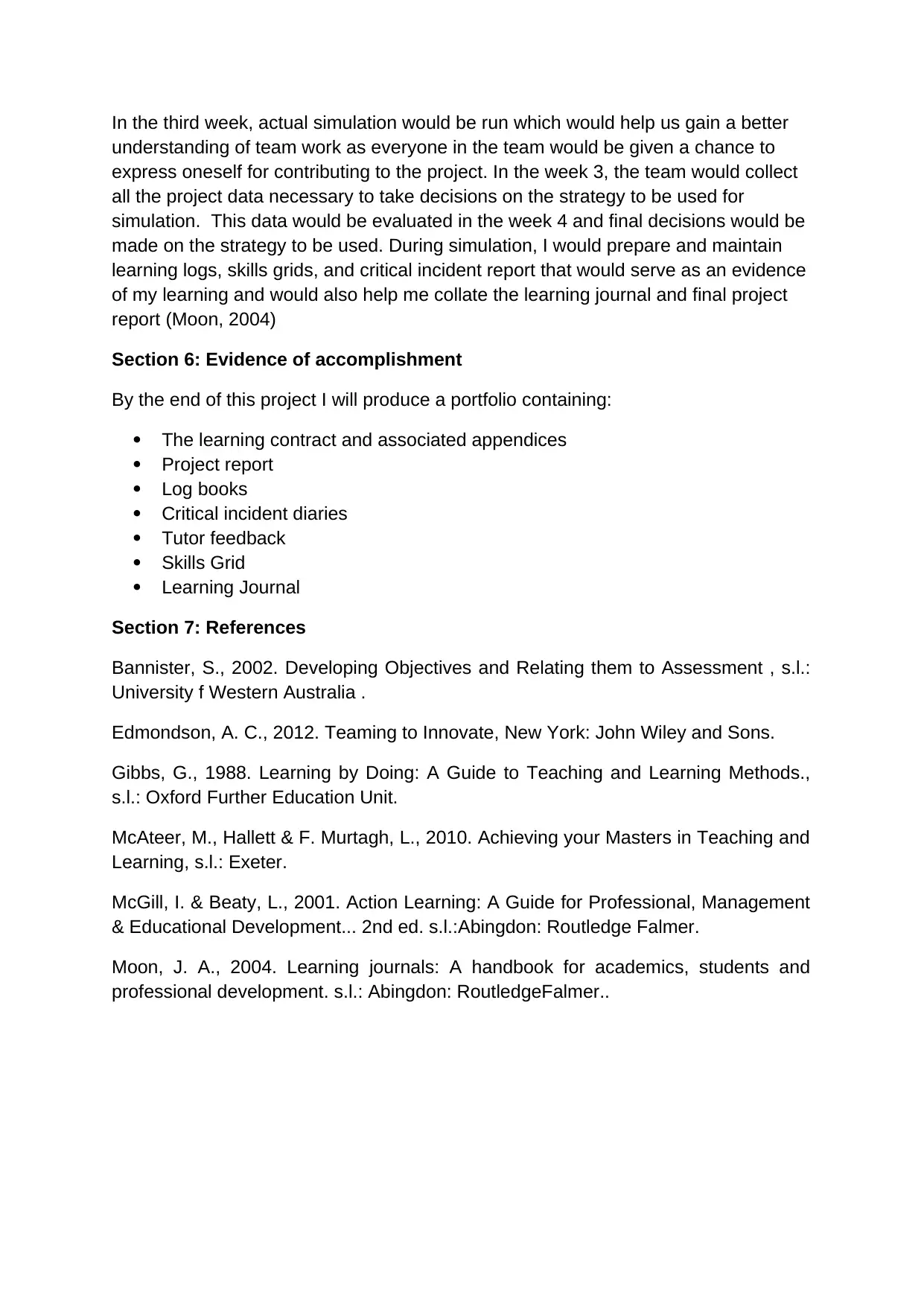
In the third week, actual simulation would be run which would help us gain a better
understanding of team work as everyone in the team would be given a chance to
express oneself for contributing to the project. In the week 3, the team would collect
all the project data necessary to take decisions on the strategy to be used for
simulation. This data would be evaluated in the week 4 and final decisions would be
made on the strategy to be used. During simulation, I would prepare and maintain
learning logs, skills grids, and critical incident report that would serve as an evidence
of my learning and would also help me collate the learning journal and final project
report (Moon, 2004)
Section 6: Evidence of accomplishment
By the end of this project I will produce a portfolio containing:
The learning contract and associated appendices
Project report
Log books
Critical incident diaries
Tutor feedback
Skills Grid
Learning Journal
Section 7: References
Bannister, S., 2002. Developing Objectives and Relating them to Assessment , s.l.:
University f Western Australia .
Edmondson, A. C., 2012. Teaming to Innovate, New York: John Wiley and Sons.
Gibbs, G., 1988. Learning by Doing: A Guide to Teaching and Learning Methods.,
s.l.: Oxford Further Education Unit.
McAteer, M., Hallett & F. Murtagh, L., 2010. Achieving your Masters in Teaching and
Learning, s.l.: Exeter.
McGill, I. & Beaty, L., 2001. Action Learning: A Guide for Professional, Management
& Educational Development... 2nd ed. s.l.:Abingdon: Routledge Falmer.
Moon, J. A., 2004. Learning journals: A handbook for academics, students and
professional development. s.l.: Abingdon: RoutledgeFalmer..
understanding of team work as everyone in the team would be given a chance to
express oneself for contributing to the project. In the week 3, the team would collect
all the project data necessary to take decisions on the strategy to be used for
simulation. This data would be evaluated in the week 4 and final decisions would be
made on the strategy to be used. During simulation, I would prepare and maintain
learning logs, skills grids, and critical incident report that would serve as an evidence
of my learning and would also help me collate the learning journal and final project
report (Moon, 2004)
Section 6: Evidence of accomplishment
By the end of this project I will produce a portfolio containing:
The learning contract and associated appendices
Project report
Log books
Critical incident diaries
Tutor feedback
Skills Grid
Learning Journal
Section 7: References
Bannister, S., 2002. Developing Objectives and Relating them to Assessment , s.l.:
University f Western Australia .
Edmondson, A. C., 2012. Teaming to Innovate, New York: John Wiley and Sons.
Gibbs, G., 1988. Learning by Doing: A Guide to Teaching and Learning Methods.,
s.l.: Oxford Further Education Unit.
McAteer, M., Hallett & F. Murtagh, L., 2010. Achieving your Masters in Teaching and
Learning, s.l.: Exeter.
McGill, I. & Beaty, L., 2001. Action Learning: A Guide for Professional, Management
& Educational Development... 2nd ed. s.l.:Abingdon: Routledge Falmer.
Moon, J. A., 2004. Learning journals: A handbook for academics, students and
professional development. s.l.: Abingdon: RoutledgeFalmer..
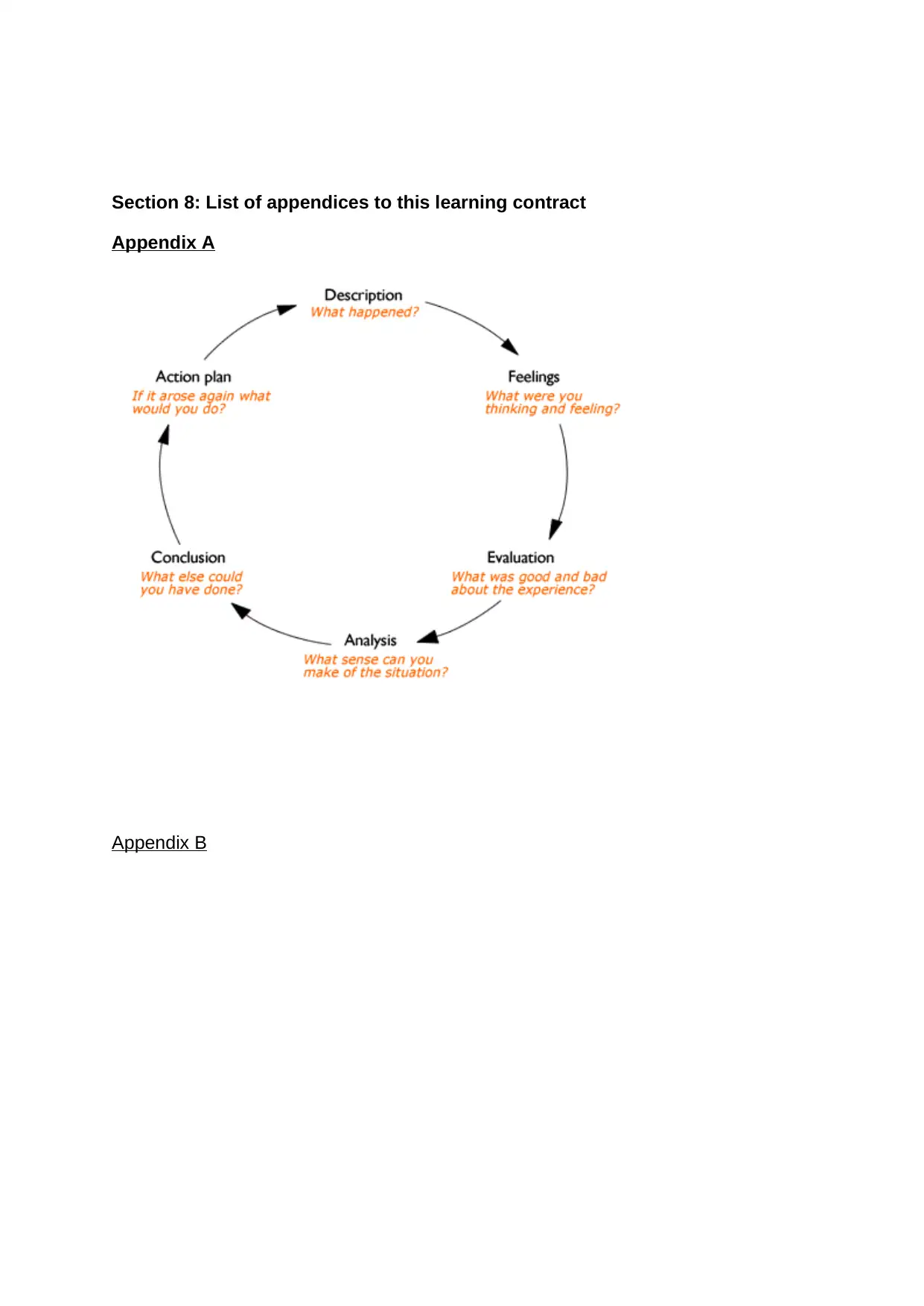
Section 8: List of appendices to this learning contract
Appendix A
Appendix B
Appendix A
Appendix B
⊘ This is a preview!⊘
Do you want full access?
Subscribe today to unlock all pages.

Trusted by 1+ million students worldwide

Signed: Tutor/Supervisor
Signed: Student
Date:
Signed: Student
Date:
Paraphrase This Document
Need a fresh take? Get an instant paraphrase of this document with our AI Paraphraser
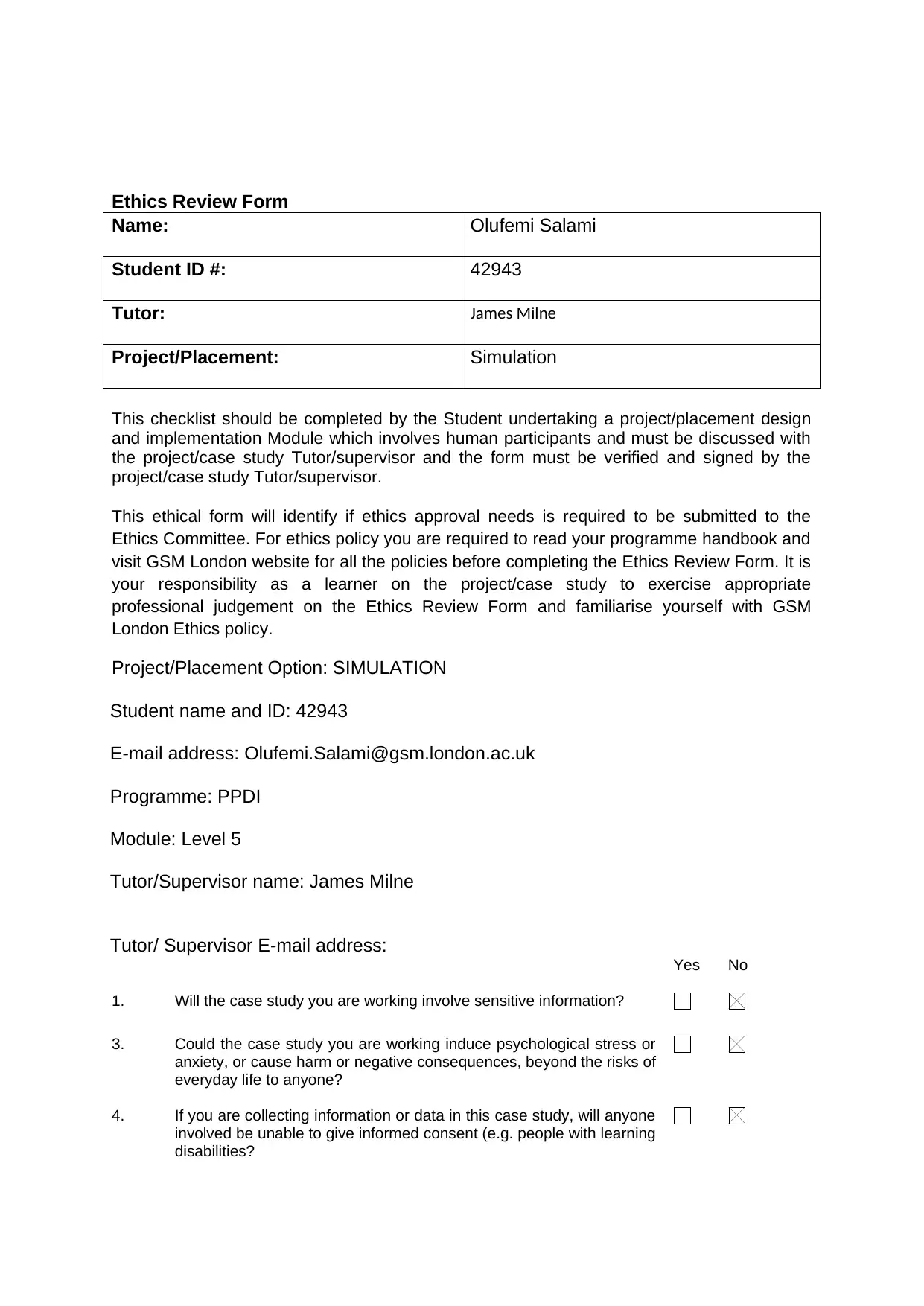
Ethics Review Form
Name: Olufemi Salami
Student ID #: 42943
Tutor: James Milne
Project/Placement: Simulation
This checklist should be completed by the Student undertaking a project/placement design
and implementation Module which involves human participants and must be discussed with
the project/case study Tutor/supervisor and the form must be verified and signed by the
project/case study Tutor/supervisor.
This ethical form will identify if ethics approval needs is required to be submitted to the
Ethics Committee. For ethics policy you are required to read your programme handbook and
visit GSM London website for all the policies before completing the Ethics Review Form. It is
your responsibility as a learner on the project/case study to exercise appropriate
professional judgement on the Ethics Review Form and familiarise yourself with GSM
London Ethics policy.
Project/Placement Option: SIMULATION
Student name and ID: 42943
E-mail address: Olufemi.Salami@gsm.london.ac.uk
Programme: PPDI
Module: Level 5
Tutor/Supervisor name: James Milne
Tutor/ Supervisor E-mail address: Yes No
1. Will the case study you are working involve sensitive information?
3. Could the case study you are working induce psychological stress or
anxiety, or cause harm or negative consequences, beyond the risks of
everyday life to anyone?
4. If you are collecting information or data in this case study, will anyone
involved be unable to give informed consent (e.g. people with learning
disabilities?
Name: Olufemi Salami
Student ID #: 42943
Tutor: James Milne
Project/Placement: Simulation
This checklist should be completed by the Student undertaking a project/placement design
and implementation Module which involves human participants and must be discussed with
the project/case study Tutor/supervisor and the form must be verified and signed by the
project/case study Tutor/supervisor.
This ethical form will identify if ethics approval needs is required to be submitted to the
Ethics Committee. For ethics policy you are required to read your programme handbook and
visit GSM London website for all the policies before completing the Ethics Review Form. It is
your responsibility as a learner on the project/case study to exercise appropriate
professional judgement on the Ethics Review Form and familiarise yourself with GSM
London Ethics policy.
Project/Placement Option: SIMULATION
Student name and ID: 42943
E-mail address: Olufemi.Salami@gsm.london.ac.uk
Programme: PPDI
Module: Level 5
Tutor/Supervisor name: James Milne
Tutor/ Supervisor E-mail address: Yes No
1. Will the case study you are working involve sensitive information?
3. Could the case study you are working induce psychological stress or
anxiety, or cause harm or negative consequences, beyond the risks of
everyday life to anyone?
4. If you are collecting information or data in this case study, will anyone
involved be unable to give informed consent (e.g. people with learning
disabilities?
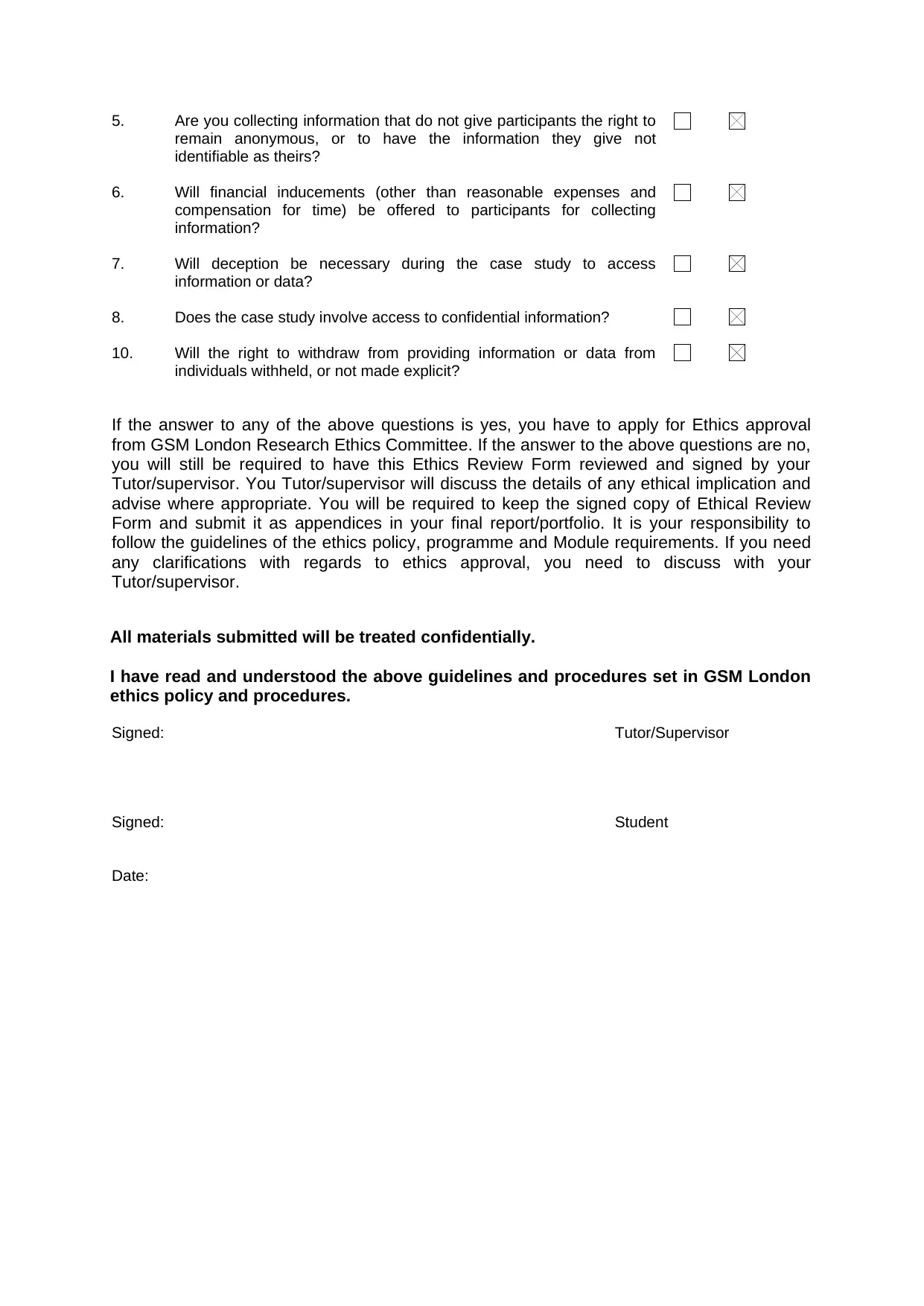
5. Are you collecting information that do not give participants the right to
remain anonymous, or to have the information they give not
identifiable as theirs?
6. Will financial inducements (other than reasonable expenses and
compensation for time) be offered to participants for collecting
information?
7. Will deception be necessary during the case study to access
information or data?
8. Does the case study involve access to confidential information?
10. Will the right to withdraw from providing information or data from
individuals withheld, or not made explicit?
If the answer to any of the above questions is yes, you have to apply for Ethics approval
from GSM London Research Ethics Committee. If the answer to the above questions are no,
you will still be required to have this Ethics Review Form reviewed and signed by your
Tutor/supervisor. You Tutor/supervisor will discuss the details of any ethical implication and
advise where appropriate. You will be required to keep the signed copy of Ethical Review
Form and submit it as appendices in your final report/portfolio. It is your responsibility to
follow the guidelines of the ethics policy, programme and Module requirements. If you need
any clarifications with regards to ethics approval, you need to discuss with your
Tutor/supervisor.
All materials submitted will be treated confidentially.
I have read and understood the above guidelines and procedures set in GSM London
ethics policy and procedures.
Signed: Tutor/Supervisor
Signed: Student
Date:
remain anonymous, or to have the information they give not
identifiable as theirs?
6. Will financial inducements (other than reasonable expenses and
compensation for time) be offered to participants for collecting
information?
7. Will deception be necessary during the case study to access
information or data?
8. Does the case study involve access to confidential information?
10. Will the right to withdraw from providing information or data from
individuals withheld, or not made explicit?
If the answer to any of the above questions is yes, you have to apply for Ethics approval
from GSM London Research Ethics Committee. If the answer to the above questions are no,
you will still be required to have this Ethics Review Form reviewed and signed by your
Tutor/supervisor. You Tutor/supervisor will discuss the details of any ethical implication and
advise where appropriate. You will be required to keep the signed copy of Ethical Review
Form and submit it as appendices in your final report/portfolio. It is your responsibility to
follow the guidelines of the ethics policy, programme and Module requirements. If you need
any clarifications with regards to ethics approval, you need to discuss with your
Tutor/supervisor.
All materials submitted will be treated confidentially.
I have read and understood the above guidelines and procedures set in GSM London
ethics policy and procedures.
Signed: Tutor/Supervisor
Signed: Student
Date:
⊘ This is a preview!⊘
Do you want full access?
Subscribe today to unlock all pages.

Trusted by 1+ million students worldwide
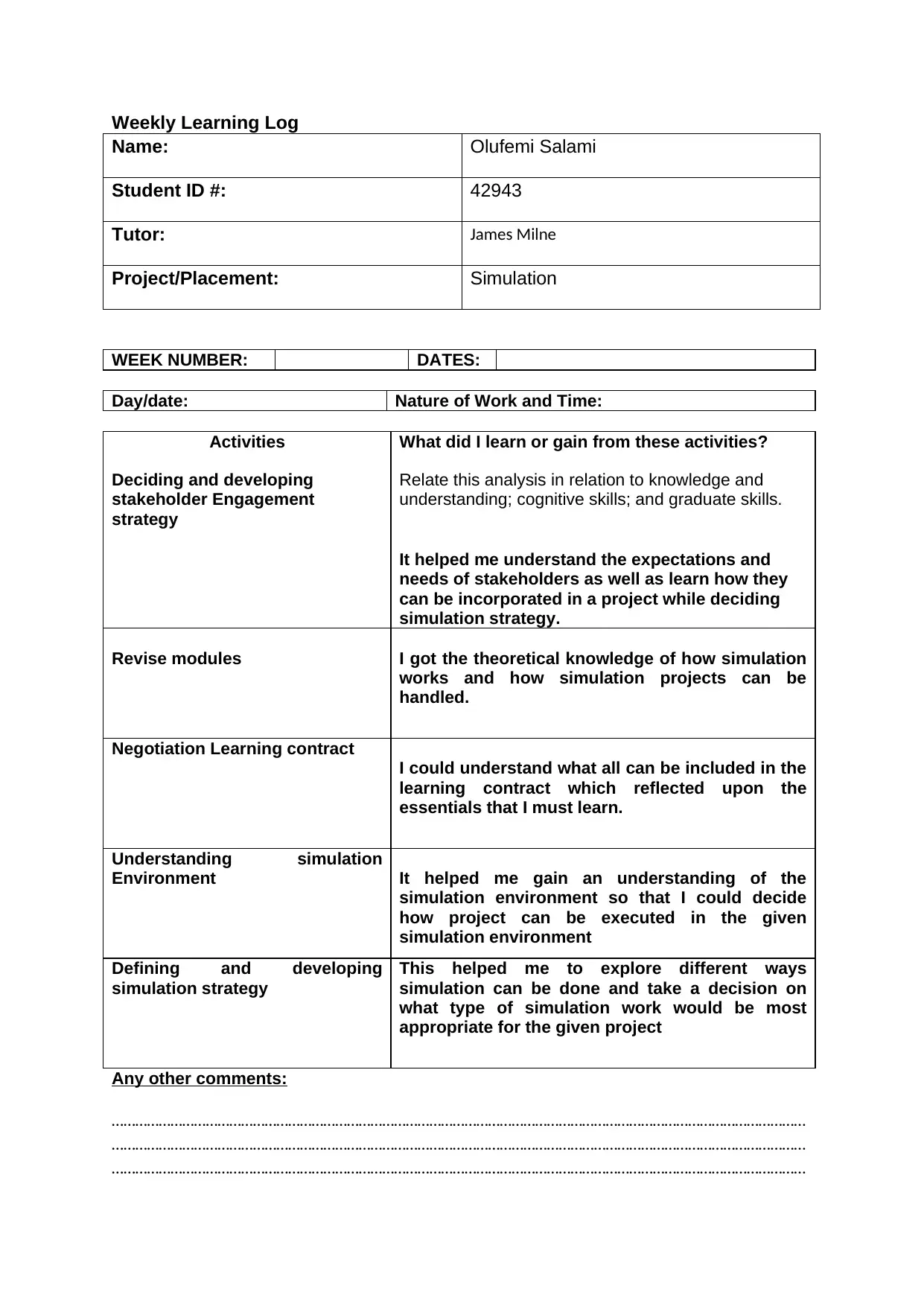
Weekly Learning Log
Name: Olufemi Salami
Student ID #: 42943
Tutor: James Milne
Project/Placement: Simulation
WEEK NUMBER: DATES:
Day/date: Nature of Work and Time:
Activities
Deciding and developing
stakeholder Engagement
strategy
What did I learn or gain from these activities?
Relate this analysis in relation to knowledge and
understanding; cognitive skills; and graduate skills.
It helped me understand the expectations and
needs of stakeholders as well as learn how they
can be incorporated in a project while deciding
simulation strategy.
Revise modules I got the theoretical knowledge of how simulation
works and how simulation projects can be
handled.
Negotiation Learning contract
I could understand what all can be included in the
learning contract which reflected upon the
essentials that I must learn.
Understanding simulation
Environment It helped me gain an understanding of the
simulation environment so that I could decide
how project can be executed in the given
simulation environment
Defining and developing
simulation strategy
This helped me to explore different ways
simulation can be done and take a decision on
what type of simulation work would be most
appropriate for the given project
Any other comments:
……………………………………………………………………………………………………………………………………………………………
……………………………………………………………………………………………………………………………………………………………
……………………………………………………………………………………………………………………………………………………………
Name: Olufemi Salami
Student ID #: 42943
Tutor: James Milne
Project/Placement: Simulation
WEEK NUMBER: DATES:
Day/date: Nature of Work and Time:
Activities
Deciding and developing
stakeholder Engagement
strategy
What did I learn or gain from these activities?
Relate this analysis in relation to knowledge and
understanding; cognitive skills; and graduate skills.
It helped me understand the expectations and
needs of stakeholders as well as learn how they
can be incorporated in a project while deciding
simulation strategy.
Revise modules I got the theoretical knowledge of how simulation
works and how simulation projects can be
handled.
Negotiation Learning contract
I could understand what all can be included in the
learning contract which reflected upon the
essentials that I must learn.
Understanding simulation
Environment It helped me gain an understanding of the
simulation environment so that I could decide
how project can be executed in the given
simulation environment
Defining and developing
simulation strategy
This helped me to explore different ways
simulation can be done and take a decision on
what type of simulation work would be most
appropriate for the given project
Any other comments:
……………………………………………………………………………………………………………………………………………………………
……………………………………………………………………………………………………………………………………………………………
……………………………………………………………………………………………………………………………………………………………
Paraphrase This Document
Need a fresh take? Get an instant paraphrase of this document with our AI Paraphraser
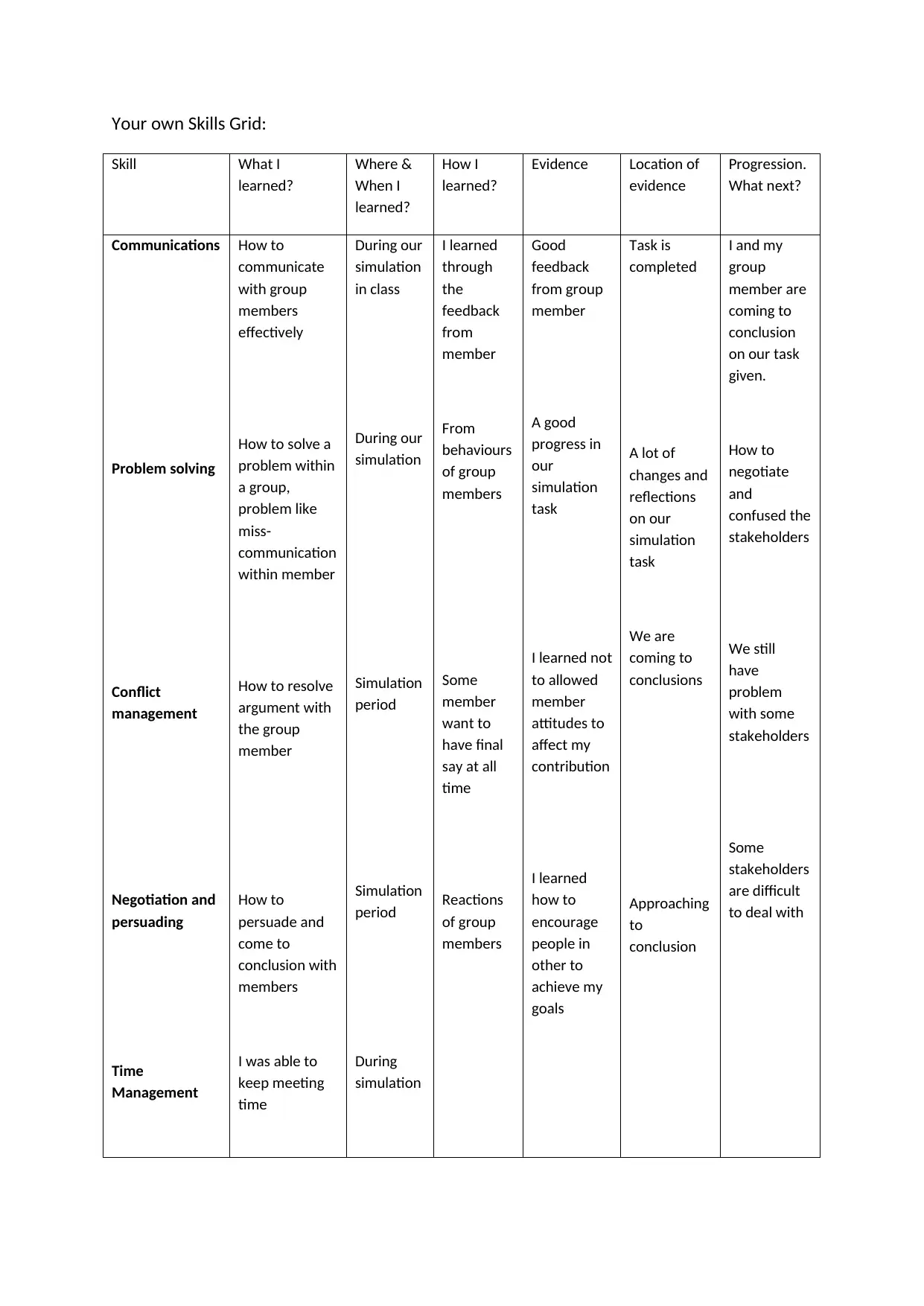
Your own Skills Grid:
Skill What I
learned?
Where &
When I
learned?
How I
learned?
Evidence Location of
evidence
Progression.
What next?
Communications
Problem solving
Conflict
management
Negotiation and
persuading
Time
Management
How to
communicate
with group
members
effectively
How to solve a
problem within
a group,
problem like
miss-
communication
within member
How to resolve
argument with
the group
member
How to
persuade and
come to
conclusion with
members
I was able to
keep meeting
time
During our
simulation
in class
During our
simulation
Simulation
period
Simulation
period
During
simulation
I learned
through
the
feedback
from
member
From
behaviours
of group
members
Some
member
want to
have final
say at all
time
Reactions
of group
members
Good
feedback
from group
member
A good
progress in
our
simulation
task
I learned not
to allowed
member
attitudes to
affect my
contribution
I learned
how to
encourage
people in
other to
achieve my
goals
Task is
completed
A lot of
changes and
reflections
on our
simulation
task
We are
coming to
conclusions
Approaching
to
conclusion
I and my
group
member are
coming to
conclusion
on our task
given.
How to
negotiate
and
confused the
stakeholders
We still
have
problem
with some
stakeholders
Some
stakeholders
are difficult
to deal with
Skill What I
learned?
Where &
When I
learned?
How I
learned?
Evidence Location of
evidence
Progression.
What next?
Communications
Problem solving
Conflict
management
Negotiation and
persuading
Time
Management
How to
communicate
with group
members
effectively
How to solve a
problem within
a group,
problem like
miss-
communication
within member
How to resolve
argument with
the group
member
How to
persuade and
come to
conclusion with
members
I was able to
keep meeting
time
During our
simulation
in class
During our
simulation
Simulation
period
Simulation
period
During
simulation
I learned
through
the
feedback
from
member
From
behaviours
of group
members
Some
member
want to
have final
say at all
time
Reactions
of group
members
Good
feedback
from group
member
A good
progress in
our
simulation
task
I learned not
to allowed
member
attitudes to
affect my
contribution
I learned
how to
encourage
people in
other to
achieve my
goals
Task is
completed
A lot of
changes and
reflections
on our
simulation
task
We are
coming to
conclusions
Approaching
to
conclusion
I and my
group
member are
coming to
conclusion
on our task
given.
How to
negotiate
and
confused the
stakeholders
We still
have
problem
with some
stakeholders
Some
stakeholders
are difficult
to deal with
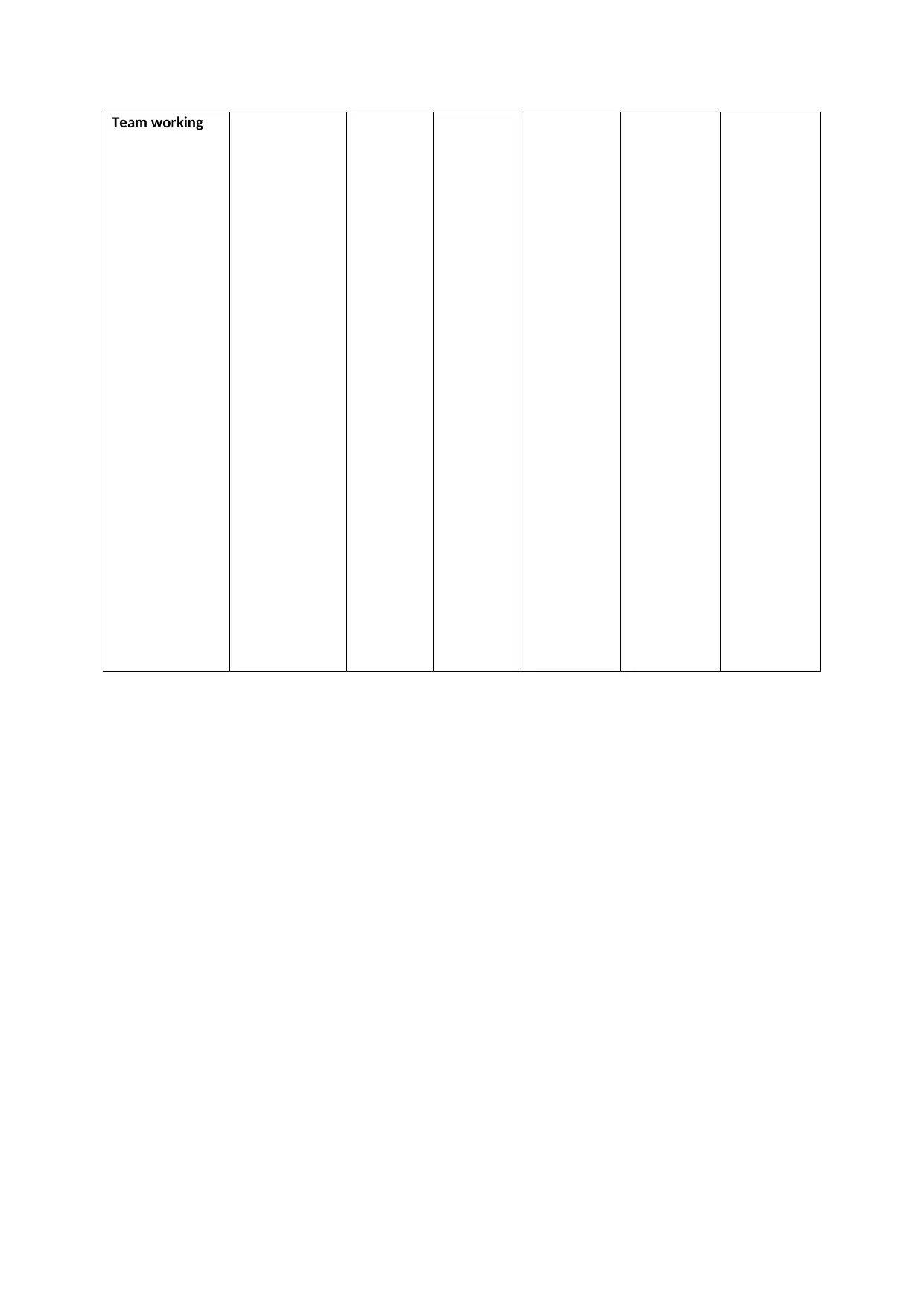
Team working
⊘ This is a preview!⊘
Do you want full access?
Subscribe today to unlock all pages.

Trusted by 1+ million students worldwide
1 out of 26
Related Documents
Your All-in-One AI-Powered Toolkit for Academic Success.
+13062052269
info@desklib.com
Available 24*7 on WhatsApp / Email
![[object Object]](/_next/static/media/star-bottom.7253800d.svg)
Unlock your academic potential
Copyright © 2020–2026 A2Z Services. All Rights Reserved. Developed and managed by ZUCOL.




